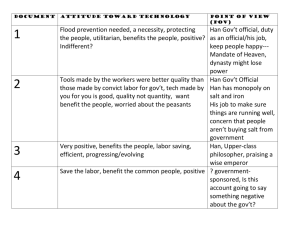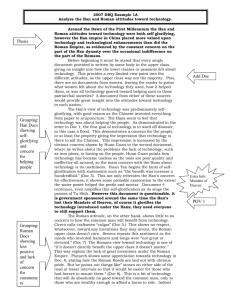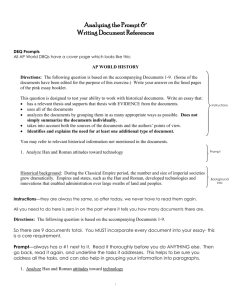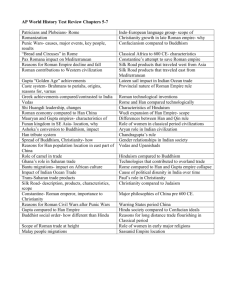DBQ Essay Han and Roman Attidtudes Toward Technology
advertisement
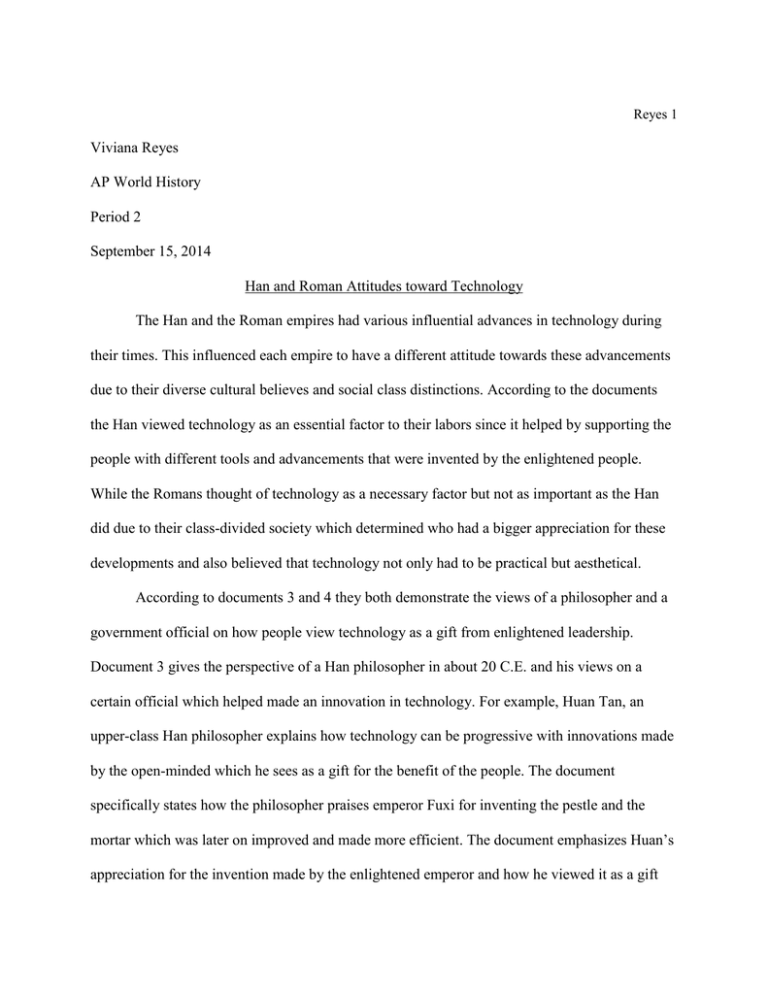
Reyes 1 Viviana Reyes AP World History Period 2 September 15, 2014 Han and Roman Attitudes toward Technology The Han and the Roman empires had various influential advances in technology during their times. This influenced each empire to have a different attitude towards these advancements due to their diverse cultural believes and social class distinctions. According to the documents the Han viewed technology as an essential factor to their labors since it helped by supporting the people with different tools and advancements that were invented by the enlightened people. While the Romans thought of technology as a necessary factor but not as important as the Han did due to their class-divided society which determined who had a bigger appreciation for these developments and also believed that technology not only had to be practical but aesthetical. According to documents 3 and 4 they both demonstrate the views of a philosopher and a government official on how people view technology as a gift from enlightened leadership. Document 3 gives the perspective of a Han philosopher in about 20 C.E. and his views on a certain official which helped made an innovation in technology. For example, Huan Tan, an upper-class Han philosopher explains how technology can be progressive with innovations made by the open-minded which he sees as a gift for the benefit of the people. The document specifically states how the philosopher praises emperor Fuxi for inventing the pestle and the mortar which was later on improved and made more efficient. The document emphasizes Huan’s appreciation for the invention made by the enlightened emperor and how he viewed it as a gift Reyes 2 which supported Confucian thoughts. While in document 4 a government sponsored history book History of the Early Han Dynasty illustrates the development of a governor who invented a technological advancement with helped benefit the people in about 31 C.E. In fact, the document analyzes Tu Shih’s work because he wanted to facilitate their labor by inventing a water powered blowing-engine that gave people the benefit of little labor. The document shows how technology was a gift for the people by helping them decrease their labor and it’s important because it was provided by an enlightened governor of Nanyang. Therefore, both documents 3 and 4 analyze how people in the Han Dynasty thought that technology was a gift that should be provided my enlightened officials. The Roman Empire had aesthetic views toward technology since they believed it was not just about the function of their developments but the form and therefore they thought their technology had to be artistic as well. In documents 6 and 8 Roman a philosopher and government official describe their attitudes toward Roman technology. For example, in document 6 a Greek-born Roman citizen and high official named Plutarch describes the advancements of political leader Gaius Gracchus in technology. He analyzes Gracchus’s road building and he was detailed and wanted to make his roads beautiful and pleasing to the eye. The roads not only were artistic but gave imperial benefits by helping link regions to Rome. According to document 8, a Roman general and a water commissioner for the city of Rome named Frontinus, illustrates the idea of the aesthetic nature of Roman technology. He analyzes the unique features of the Roman aqueducts and describes how technology is beneficial as well as aesthetic. In fact, he brags about Roman’s structures and compares them to others such as the Reyes 3 Egyptian pyramids and Greek famous works. So, Romans had a clear aesthetic attitude towards their technology and believed how both the function and the form were important factors. The Roman and the Han had diverse attitudes towards technology being essential, since the Romans had social stratification they viewed technology differently because the level of appreciation of technology varied from the upper class and the lower class. For instance, Roman political leader Cicero thought that technology was necessary and important but not for the upper classmen, it was more for the lower classmen. According to document 5, Cicerco, an upper-class Roman political leader, addresses how technology was used by craftsmen and others with similar occupations but not by the enlightened. Actually, document 7 supports this attitude since Seneca, who is an upper-class Roman philosopher; states how technology can be created by anyone who is smart and skilled but that doesn’t necessarily mean that they are enlightened. While the Han on the other hand, they thought technology was essential for everybody and didn’t care so much about the different social classes like the Romans. For example, in document1 a Han government official explains how the government authority develops the needs to regulate the production of technology. Likewise in document 2, Huan Guan, a government official, illustrates how the government should provide substandard tools for the workers and therefore states how technology is essential. In order to thoroughly understand the Roman attitudes toward technology being essential it would be resourceful to have an additional document with the opinion of a lower classmen from Rome addressing the same issues that Cicerco and Seneca explained. This way the reader can interpret the difference in the social stratification in Rome and how the lower-class would disagree with the upper-class since technology benefits them the most. The lower-class would Reyes 4 probably view technology as something essential and not just necessary like the upper-class since it makes them have less labor. While for the Han an additional document emphasizing the perspective of a worker or craftsmen might help support the attitude that technology is essential for their labor since it helps decrease their amount of work. Therefore, the Roman and the Han have different attitudes towards the levels in which technology is essential. The Han had a more positive outlook toward technology compared to the Romans since the Han thought of technology as something more essential and necessary for them. While the Romans viewed technology as an advantage more for the lower-classes then the upper-classes and also believed that technology should be artistic as well as functional. In fact, the Han and Roman empires had diverse attitudes for technology but they both were very influential in their advancements and developments.
